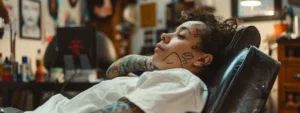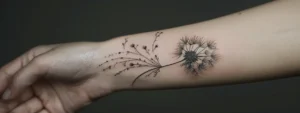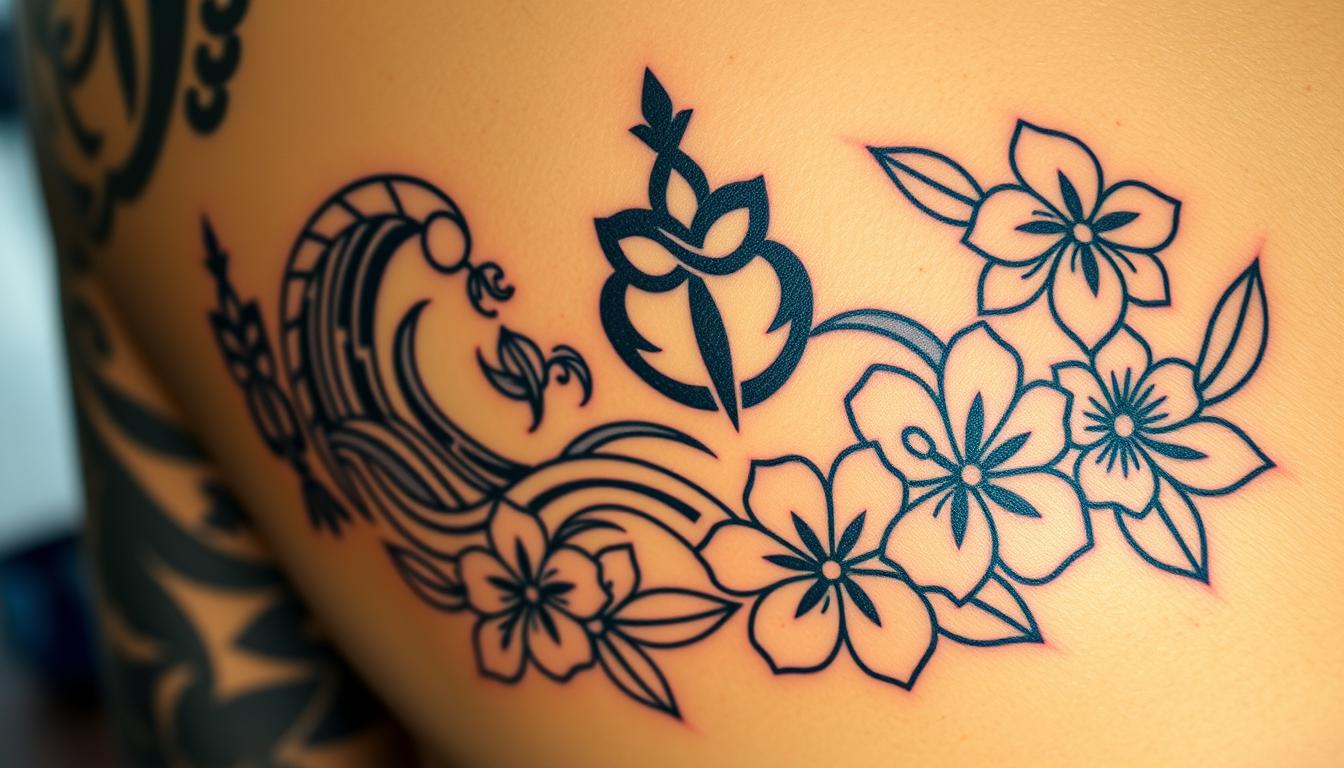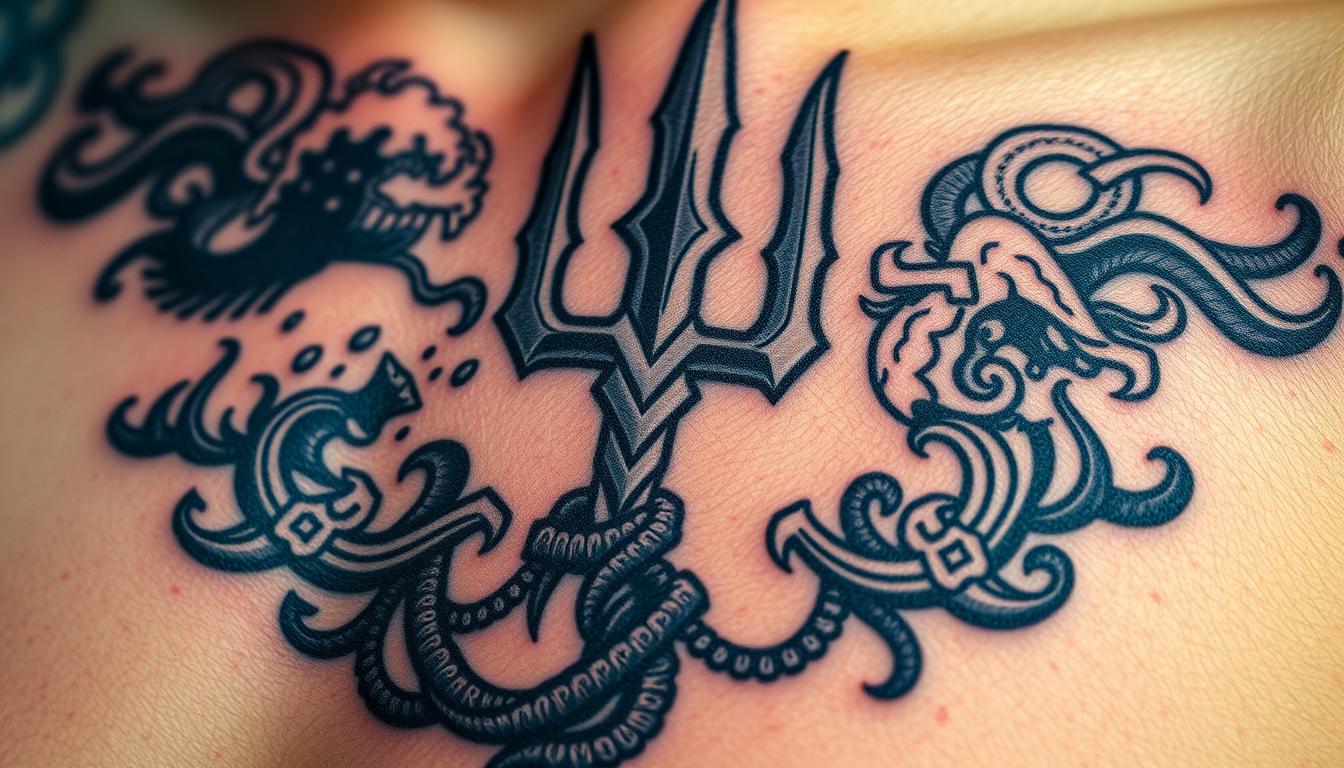Can a 14-year-old get a tattoo with parental consent? This question often puzzles both teens and parents. In this article, we’ll explore tattoo laws for minors worldwide, the role of parental consent, and the potential risks of tattoos for young teens. We’ll also discuss alternative forms of self-expression and provide guidance for parents navigating tattoo discussions with their teenagers. By understanding the legal, health, and social aspects of teen tattoos, readers will be better equipped to make informed decisions and have productive conversations about this complex issue.
Key Takeaways
- Tattoo laws for minors vary globally, with age restrictions and parental consent requirements differing by jurisdiction
- Health risks for young teens include infections, allergic reactions, and potential long-term regret
- Alternatives like temporary tattoos, art, and fashion choices offer safer self-expression options for teens
- Open communication and researching together can help parents and teens make informed decisions about tattoos
- Seeking professional advice from counselors or legal experts can provide valuable guidance in tattoo discussions
Understanding Tattoo Laws for Minors Worldwide

Tattoo laws for minors vary worldwide, with different age restrictions and regulations across countries and regions. This section explores legal age limits, state and provincial differences, exceptions for underage tattoos, the role of parental consent, and penalties for violating laws. Understanding these regulations is crucial for teens, parents, and tattoo artists to make informed decisions and avoid legal issues.
Legal Age Restrictions for Tattoos in Various Countries
Legal age restrictions for tattoos vary significantly across countries, reflecting diverse cultural norms and health considerations. In many nations, the minimum age for getting a tattoo without parental consent is 18, aligning with legal adulthood. However, some countries allow minors to get tattoos with parental permission, while others have stricter regulations. These laws aim to protect minors from potential health risks, such as infections or scarring, and ensure informed decision-making. Local health departments often play a role in enforcing these regulations and providing guidance on safe tattooing practices.
Differences in State and Provincial Regulations
State and provincial regulations regarding tattoos for minors vary widely across the United States and other countries. Some states allow minors to get tattoos with parental consent, while others prohibit it entirely. Certain jurisdictions require a physician’s presence or approval for therapeutic tattoos on minors. The legal landscape is complex, with some states treating tattoo contracts with minors as voidable, potentially affecting the enforceability of parental consent forms.
Exceptions to the Rules: Special Cases Allowing Underage Tattoos
While most jurisdictions strictly regulate tattoos for minors, some exceptions exist for medical or cultural reasons. In certain cases, minors may receive tattoos as part of medical treatment or skin surgery, particularly for reconstructive purposes. Some states, like Nevada, have specific regulations allowing underage tattoos for medical reasons under a physician’s supervision. Cultural practices, such as traditional tattooing in indigenous communities, may also be exempt from standard age restrictions. However, these exceptions are typically well-defined and require proper documentation and professional oversight:
| Exception Type | Description | Requirements |
|---|---|---|
| Medical | Tattoos for reconstructive surgery or treatment | Physician supervision, parental consent |
| Cultural | Traditional tattooing practices | Cultural significance, community approval |
| Cosmetic | Permanent makeup or scar camouflage | Licensed practitioner, parental consent |
The Role of Parental Consent in Tattoo Regulations
Parental consent plays a crucial role in tattoo regulations for minors worldwide. Laws regarding body piercing and tattooing often require parental permission for individuals under 18. In California, for example, criminal law prohibits tattooing minors regardless of parental consent. However, other jurisdictions allow tattoos for minors with written parental approval. These regulations aim to balance respect for parental rights with protecting minors from potential health risks and long-term consequences. The specific requirements for parental consent vary by location and may include:
- Written permission forms
- In-person consent at the tattoo studio
- Notarized documents
- Age verification for both the minor and consenting parent
- Mandatory waiting periods between consent and the procedure
Penalties for Breaking Tattoo Laws Involving Minors
Penalties for breaking tattoo laws involving minors vary by jurisdiction and can be severe. In many states, including Maryland, tattooing a minor without parental consent is a misdemeanor offense, potentially resulting in fines and imprisonment. Some jurisdictions impose stricter penalties if alcohol was involved or if the tattoo artist knowingly violated age restrictions. Parents who provide false consent or misrepresent their child’s age may also face legal consequences, highlighting the importance of understanding and adhering to local tattoo regulations.
Parental Consent and Its Influence on Tattoo Permissions

Parental consent plays a crucial role in underage tattoo permissions. This section explores how consent works, legal procedures, regional limitations, required documents, and cases where consent is not accepted. Understanding these aspects is essential for legal guardians navigating tattoo codes and regulations for minors.
How Parental Consent Works for Underage Tattoos
Parental consent for underage tattoos typically involves a legal guardian providing written permission for a minor to get tattooed. In jurisdictions where this is allowed, the process often requires the parent or guardian to accompany the minor to the tattoo studio, provide valid identification, and sign a consent form in the presence of the tattoo artist. Some areas may require additional steps, such as notarization of the consent form or a mandatory waiting period between consent and the procedure.
Legal Procedures for Granting Consent
Legal procedures for granting consent for underage tattoos vary by jurisdiction but typically involve specific steps to ensure validity and compliance. In most cases, a legal guardian must provide written consent, often in the presence of the tattoo artist, and present valid identification. Some areas require notarization of consent forms or mandate a waiting period between consent and the procedure. The specific requirements aim to protect minors and ensure informed decision-making:
| Step | Description | Purpose |
|---|---|---|
| Identification Verification | Checking guardian’s ID and minor’s proof of age | Confirm legal authority and age |
| Written Consent | Signing official consent form | Document permission and understanding |
| Notarization (if required) | Official certification of consent | Add legal weight to consent |
| Waiting Period | Mandatory time between consent and procedure | Allow for reflection and informed decision |
Limitations of Parental Consent in Different Regions
Parental consent for tattoos faces varying limitations across different regions. In some areas, parental consent is insufficient to allow minors to get tattoos, as local laws prohibit tattooing individuals under 18 regardless of guardian approval. Other jurisdictions may set higher age limits or require additional safeguards, such as a physician’s presence or approval for therapeutic tattoos. These regional differences reflect diverse cultural attitudes, health concerns, and legal frameworks surrounding body modification for minors:
| Region | Parental Consent Limitation | Additional Requirements |
|---|---|---|
| California, USA | Not accepted for minors | Minimum age 18 for all tattoos |
| New York, USA | Accepted with restrictions | Written consent, in-person presence |
| United Kingdom | Not accepted for under 16 | 16-17 requires parental consent |
| Australia | Varies by state | Some states require medical approval |
Documents Required for Proof of Consent
Documents required for proof of consent in underage tattoo procedures typically include a government-issued photo ID of the parent or legal guardian, the minor’s birth certificate or passport, and a notarized consent form. Some jurisdictions may also require additional documentation, such as proof of guardianship or a physician’s approval for medical tattoos. Tattoo studios often maintain these records for a specified period to comply with local regulations and protect themselves from potential legal issues.
Cases Where Parental Consent Is Not Accepted
In certain jurisdictions, parental consent is not accepted for underage tattoos due to strict legal restrictions. Some states and countries prohibit tattooing minors regardless of guardian approval, prioritizing health and safety concerns. These regulations often stem from the belief that individuals under 18 may lack the maturity to make permanent decisions about body modification. Common scenarios where parental consent is invalid include:
- Jurisdictions with absolute age restrictions (e.g., California)
- Cases involving potential exploitation or coercion
- Situations where the minor’s mental capacity is questioned
- Instances where the proposed tattoo violates local decency laws
- Circumstances where the tattoo artist deems the procedure unsafe or unethical
Reasons Teens Consider Getting Tattoos at 14

Teens at 14 may consider tattoos for various reasons. Personal expression, cultural significance, peer influence, commemorating events, and media impact all play roles. These factors shape young adolescents’ desire for permanent body art, despite legal and health considerations. Understanding these motivations is crucial for parents and professionals addressing teen tattoo requests.
Personal Expression and Identity Exploration
Personal expression and identity exploration drive many 14-year-olds to consider tattoos. At this age, teens often seek ways to assert their individuality and define themselves apart from their parents. Tattoos can serve as a permanent symbol of their developing personality, interests, or beliefs. However, the desire for self-expression through body art at such a young age often conflicts with legal restrictions and long-term consequences, highlighting the need for guidance and education about alternative forms of self-expression.
Cultural and Religious Significance of Tattoos
Cultural and religious significance often motivates 14-year-olds to consider tattoos. In some cultures, tattoos serve as rites of passage or symbols of spiritual devotion, leading teens to seek these markings as a way to connect with their heritage or faith. For example, in Polynesian cultures, traditional tattooing holds deep cultural meaning and may be performed on younger individuals. However, these practices often clash with modern legal restrictions and health concerns, creating a complex issue for teens, parents, and authorities to navigate.
Peer Influence and Social Trends Among Teens
Peer influence and social trends significantly impact 14-year-olds’ interest in tattoos. As teenagers seek acceptance and belonging, they often emulate their peers or popular figures who have tattoos. Social media platforms and celebrity culture expose teens to a wide range of tattoo styles and designs, fueling their desire for body art. This influence can lead to impulsive decisions, as teens may not fully consider the long-term implications of permanent tattoos. The following table illustrates common sources of peer influence on teen tattoo decisions:
| Influence Source | Impact on Teens | Potential Risks |
|---|---|---|
| Social Media | Exposure to tattoo trends | Unrealistic expectations |
| Celebrity Culture | Desire to emulate idols | Choosing unsuitable designs |
| Friend Groups | Pressure to fit in | Impulsive decision-making |
| Online Communities | Access to tattoo information | Misinformation about risks |
Commemorating Important Life Events or Loved Ones
Commemorating important life events or loved ones often motivates 14-year-olds to consider tattoos. These teens may seek to memorialize a significant achievement, honor a deceased family member, or mark a transformative experience through permanent body art. However, the desire to create lasting tributes at such a young age can conflict with legal restrictions and the potential for changing perspectives as they mature. Parents and guardians play a crucial role in guiding teens towards alternative forms of commemoration that align with age-appropriate practices and legal constraints.
Media Influence on Teen Tattoo Popularity
Media significantly influences teen tattoo popularity, shaping perceptions and desires among 14-year-olds. Television shows, movies, and music videos often glamorize tattoos, presenting them as symbols of rebellion, individuality, and maturity. Social media platforms amplify this effect, with influencers and celebrities showcasing their body art to millions of young followers. This constant exposure normalizes tattoos for teens, potentially leading to increased interest and pressure to get inked at a young age, despite legal and health considerations.
Potential Risks of Tattoos for Young Teens
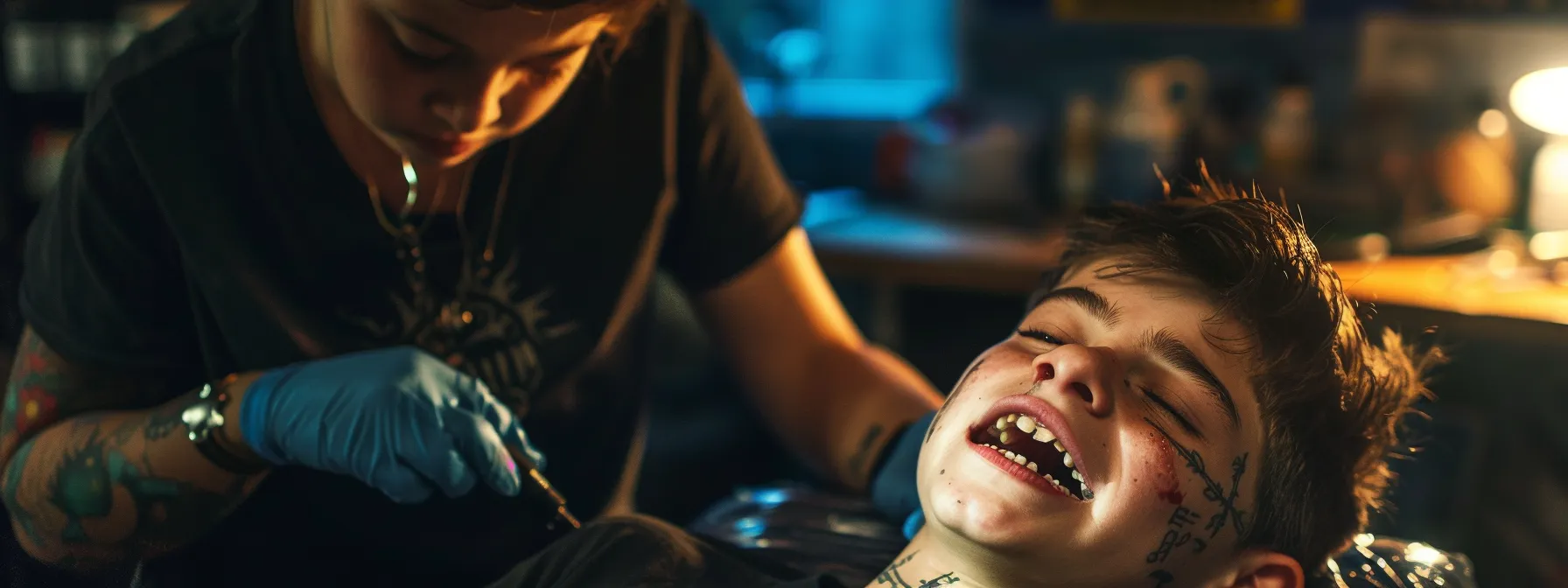
Tattoos for young teens pose significant risks. Health concerns include infections and allergic reactions. Long-term issues involve potential regret and removal challenges. Tattoos may impact future employment and educational opportunities. Psychological effects of early tattooing should be considered. Choosing a safe, reputable studio is crucial to minimize quality concerns and health risks.
Health Risks: Infections and Allergic Reactions
Tattoos for young teens carry significant health risks, including infections and allergic reactions. The immature immune systems of 14-year-olds may struggle to combat bacteria introduced during the tattooing process, leading to potentially severe skin infections. Allergic reactions to tattoo ink components can cause long-lasting skin irritation, swelling, and in rare cases, systemic reactions. These health concerns are particularly pronounced in young adolescents, whose bodies are still developing and may be more susceptible to complications from invasive procedures like tattooing.
Regret and Tattoo Removal Challenges Later in Life
Teens who get tattoos at 14 often face significant regret and removal challenges later in life. As preferences and personal identities evolve, many find that their early tattoo choices no longer reflect their adult selves. Tattoo removal processes, such as laser treatments, can be expensive, painful, and time-consuming, often requiring multiple sessions over several months or years. These procedures may not fully erase the tattoo, leaving behind scars or faded remnants, which can cause long-term dissatisfaction and impact self-esteem.
Impact on Employment and Educational Opportunities
Tattoos obtained at a young age can significantly impact future employment and educational opportunities. Many employers and educational institutions maintain policies against visible tattoos, potentially limiting career options or requiring costly and time-consuming coverup procedures. This issue becomes particularly problematic for teens who get tattoos at 14, as they may not fully comprehend the long-term consequences of their choices on professional advancement and academic pursuits.
Psychological Considerations of Early Tattooing
Early tattooing can have significant psychological impacts on young teens. At 14, adolescents are still developing their sense of identity and may not fully comprehend the long-term consequences of permanent body modification. The decision to get a tattoo at such a young age can lead to feelings of regret, anxiety, or self-consciousness as they mature and their preferences change. Additionally, teens may experience social pressure or judgment related to their tattoos, potentially affecting their self-esteem and mental well-being. Mental health professionals often caution against early tattooing due to these psychological considerations:
- Potential for identity conflicts as teens mature
- Risk of regret and associated emotional distress
- Possible negative impacts on self-image and confidence
- Increased vulnerability to peer pressure and social judgment
- Challenges in coping with permanent decisions made at a young age
Quality Concerns: Choosing a Safe and Reputable Tattoo Studio
Choosing a safe and reputable tattoo studio is crucial for young teens considering tattoos, as quality concerns can lead to serious health risks and unsatisfactory results. Reputable studios adhere to strict hygiene standards, use sterile equipment, and employ licensed artists who understand proper tattooing techniques. However, teens may lack the experience to identify quality studios, potentially exposing themselves to unsanitary conditions, low-quality ink, or inexperienced artists. This risk is compounded by the fact that many reputable studios refuse to tattoo minors, even with parental consent, limiting options for young teens seeking tattoos.
Alternative Forms of Self-Expression for Teens

Teens seeking self-expression have numerous alternatives to permanent tattoos. This section explores temporary tattoos, henna designs, art outlets, fashion choices, body piercings, and personal hobbies. These options allow young people to express their individuality without the long-term commitment and risks associated with tattoos, providing safer and more age-appropriate forms of self-expression.
Temporary Tattoos and Henna Designs
Temporary tattoos and henna designs offer teens safe and non-permanent alternatives for self-expression. These options allow young people to experiment with body art without the long-term commitment and health risks associated with permanent tattoos. Temporary tattoos come in various styles and can last from a few days to several weeks, while henna designs, derived from natural dyes, typically fade within one to three weeks. Both options provide teens with the opportunity to showcase their creativity and personal style:
- Temporary tattoos: Available in diverse designs, easy to apply and remove
- Henna art: Natural, longer-lasting option with cultural significance
- DIY temporary tattoo kits: Allow for custom designs and artistic exploration
- Airbrush tattoos: Professional-looking temporary designs for special events
- Metallic tattoos: Trendy, jewelry-like designs for a unique aesthetic
Exploring Art and Creative Outlets
Exploring art and creative outlets provides teens with constructive alternatives to permanent tattoos. These activities allow young people to express themselves, develop skills, and channel their emotions in positive ways. Art forms such as painting, drawing, sculpture, and digital design offer endless possibilities for self-expression without the risks associated with tattoos. Engaging in these creative pursuits can also boost self-esteem, reduce stress, and foster personal growth. For teens interested in body art, creating designs on paper or canvas can be a fulfilling substitute:
- Visual arts: Painting, sketching, digital illustration
- Crafts: Jewelry making, pottery, textile arts
- Performance arts: Dance, theater, music
- Literary arts: Creative writing, poetry, storytelling
- Digital media: Graphic design, animation, video production
Fashion and Personal Styling Choices
Fashion and personal styling choices offer teens a powerful means of self-expression without the permanence of tattoos. Young people can experiment with various clothing styles, accessories, hairstyles, and makeup to reflect their personalities and interests. These options allow teens to change their look as often as they like, adapting to new trends or personal growth. By exploring fashion and personal styling, adolescents can develop their unique aesthetic and build confidence in their appearance, all while avoiding the legal and health concerns associated with underage tattooing.
Body Piercings With Fewer Long-Term Commitments
Body piercings offer teens a less permanent form of self-expression compared to tattoos. Unlike tattoos, most piercings can be removed with minimal long-term effects, allowing young people to experiment with their appearance while maintaining flexibility for future changes. However, teens and parents should consider potential health risks and local regulations regarding underage piercings. Reputable piercing studios typically require parental consent for minors and adhere to strict hygiene standards to ensure safety:
- Ear piercings: Traditional and widely accepted
- Nose studs: Popular option with minimal visibility
- Lip rings: Edgy look with relatively quick healing time
- Eyebrow piercings: Distinctive facial feature alteration
- Navel piercings: Common among teens, easily concealed
Engaging in Hobbies That Reflect Personal Interests
Engaging in hobbies that reflect personal interests provides teens with a meaningful alternative to tattoos for self-expression. Adolescents can explore activities such as photography, music production, coding, or sports to showcase their individuality and develop skills. These pursuits allow young people to channel their creativity and passion into productive outlets, fostering personal growth and building confidence without the permanence of body modifications. By investing time in hobbies, teens can create a unique identity and find like-minded peers, fulfilling their need for self-expression in a constructive manner.
Guiding Parents Through Tattoo Discussions With Teens

Guiding parents through tattoo discussions with teens requires a balanced approach. This section explores opening respectful dialogues, setting boundaries, researching implications, considering compromises, and seeking professional advice. These strategies help parents navigate conversations about tattoos with their 14-year-olds, ensuring informed decisions and maintaining healthy parent-teen relationships.
Opening a Respectful and Honest Dialogue
Opening a respectful and honest dialogue about tattoos with teens requires parents to create a non-judgmental environment where both parties can express their thoughts and concerns openly. Parents should approach the conversation with curiosity, asking open-ended questions about their teen’s interest in tattoos and listening attentively to their responses. By fostering an atmosphere of trust and understanding, parents can gain insight into their child’s motivations while also sharing their own perspectives on the potential consequences of getting a tattoo at a young age.
Setting Boundaries and Explaining Limitations
Setting boundaries and explaining limitations is crucial when discussing tattoos with 14-year-olds. Parents should clearly communicate legal restrictions, health risks, and family rules regarding underage tattooing. They can emphasize the importance of waiting until the legal age, typically 18, to make such a permanent decision. By explaining the reasoning behind these limitations, parents help teens understand the complexities of body modification and encourage responsible decision-making as they mature.
Researching Together: Understanding the Implications
Researching together allows parents and teens to gain a comprehensive understanding of tattoo implications. By exploring legal restrictions, health risks, and cultural perspectives, families can make informed decisions about underage tattooing. This collaborative approach fosters open communication and helps teens recognize the long-term consequences of permanent body modifications, while also providing parents with insight into their child’s interests and motivations.
Considering Compromises and Alternatives
When discussing tattoos with 14-year-olds, parents can explore compromises and alternatives that satisfy the teen’s desire for self-expression while addressing parental concerns. Temporary tattoos, henna designs, or custom-designed clothing can offer similar creative outlets without the permanence of tattoos. Parents might also consider negotiating a future date for tattoo consideration, such as the teen’s 18th birthday, providing time for reflection and maturity. These alternatives allow families to find middle ground, fostering mutual understanding and respect while prioritizing the teen’s well-being and legal compliance.
Seeking Professional Advice From Counselors or Legal Experts
Seeking professional advice from counselors or legal experts can provide valuable guidance for parents navigating tattoo discussions with their 14-year-olds. Family therapists can offer strategies for effective communication and help address underlying issues that may be driving the teen’s desire for a tattoo. Legal professionals can clarify local laws and regulations regarding underage tattooing, ensuring families make informed decisions that comply with legal requirements. These expert perspectives can help parents and teens find common ground and explore appropriate alternatives for self-expression.
Conclusion
Understanding tattoo laws and regulations for minors is crucial for teens, parents, and tattoo artists to make informed decisions and avoid legal issues. While parental consent plays a significant role in some jurisdictions, many regions prohibit tattooing minors regardless of guardian approval, prioritizing health and safety concerns. Teens considering tattoos at 14 face potential risks, including health complications, future regret, and impacts on educational and career opportunities. Exploring alternative forms of self-expression and maintaining open dialogue between parents and teens can lead to more appropriate and less permanent choices for young adolescents seeking to express their individuality.





























